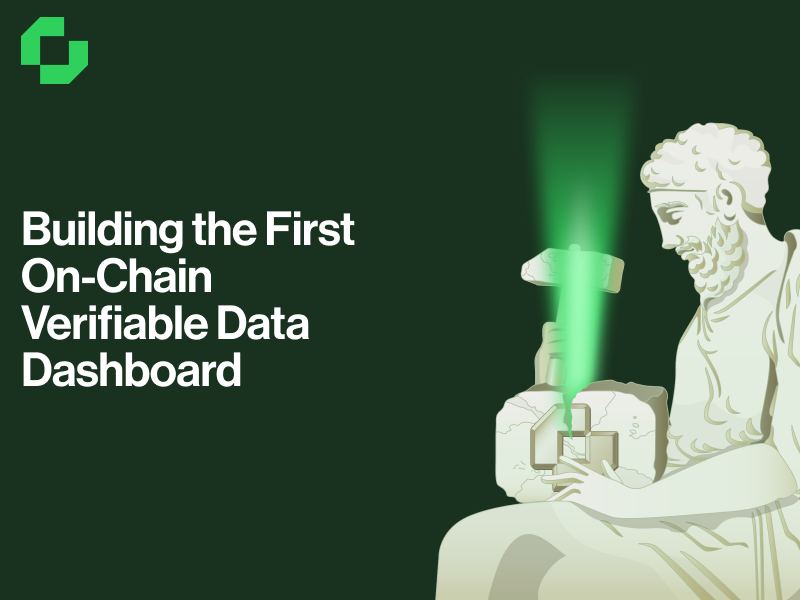Chronicle Protocol recently burst onto the blockchain Oracle scene, having exclusively secured MakerDAO for over 6 years. MakerDAO has now spun out its Oracle team as
Chronicle, and its broad range of data bridging and interoperability services are now available to all Web3 builders for the first time.
Although the Chronicle brand is new, their initial Oracle was the first-ever on Ethereum in 2017, and the technology behind the protocol is battle-tested, securing up to $20bn for
MakerDAO at the height of the crypto market in 2021. Chronicle hasn’t relied entirely on this impressive reputation, and their recent launch is underpinned by some breakthroughs in blockchain Oracle engineering that look set to disrupt the current landscape.
We sat down with Jen Senhaji, Growth Lead at Chronicle and previously of Maker Growth, to discuss what Chronicle’s developments mean for the future of data on-chain:
What are the current pain points you’re hearing about with Oracles?
“Oracles have long been criticized, and rightly so, as the Achilles heel of Defi. Decentralized protocols built to operate autonomously and without trust via code still need reliable sources of data ported into their applications. Using an external Oracle system to supply critical data has been a friction point. The risk of financial loss from Oracle manipulation is a real concern for Defi builders, and attempts at eliminating this attack vector can be seen in the emergence of “Oracleless” protocols. While these designs offer trust-minimized solutions, which can be a positive in some applications, it is not a one-size-fits-all solution. Therefore, the real work has to come from improving current Oracle designs. At Chronicle, we have approached the Oracle trilemma of achieving security, decentralization, and cost head-on.”
What makes Chronicle different from the two Oracles with the highest market share, Pyth and Chainlink?
“When we look at the best attributes of Defi, what stands out is its permissionless nature, where no barriers exist to core financial services like lending, borrowing, trading and saving. What enables permissionless systems to work is full transparency. Being able to verify, at all times, the value of a digital currency without having to trust any central entity or wait for business hours is a significant improvement.
Oracles play a crucial role in the plumbing of decentralized systems by porting data from different environments into applications encoded with rules to manage how value behaves within them. For example, when a lending protocol has to liquidate a borrower's position due to collateral falling below the protocol's set threshold, a liquidation is triggered, and that trigger point is determined by an Oracle.
Chronicle has been designed from the ground up to prioritize verifiability, security, and cost efficiencies. The process of sourcing, verifying and serving data is made available to anyone who’d like to see it via the
Chronicle dashboard, which shows the end-to-end process of an Oracle update. Just as we’ve come to expect full transparency in the Defi apps we use, such as being able to see the total value locked in a protocol or what assets are backing a stablecoin, we should be able to see where all the data originated that an Oracle uses.
A foundational technical aspect setting Chronicle apart from existing Oracle providers is its ability to scale without increasing costs. To date, Oracle systems are constrained by a linear relationship between the number of price validators they can include and the transaction costs of updating the Oracle. This means that the more validators (the actors querying data sources and supplying the prices to the dApps through an Oracle system), the more expensive the transaction to update the Oracles on-chain becomes.
The reason for this is because each validator has to sign a cryptographic message stating the price they queried, (i.e. ETH/ USD) for reporting into the Oracle to update on-chain. The more signed messages, the higher the cost of the Oracle transaction is because it contains more data (more signatures).
The way other Oracle providers have managed this cost challenge is by limiting the number of validators participating in a transaction. However, by limiting the number of validators, there is a security tradeoff because the smaller the validator set, the easier it becomes to manipulate. More validators increases the security.
Chronicle has solved this problem by implementing a proprietary signing mechanism that allows for validator signatures to be compressed into one “super” signature while maintaining all the information from each individual validator signature. This results in Chronicles Oracle updates costing 2-5x less than leading Oracle providers, all while being able to have an uncapped amount of validator participation, thereby increasing its security profile.
Just as the Ethereum network itself becomes more decentralized and secure with more validator participation, Chronicle can add more high quality validators without increasing costs. Chronicles validators are also an intentional part of its open and transparent design, where a majority of them are known, reputable Defi operators like Gitcoin, Defi Saver, Maker, Argent and Gnosis to name a few.”
What is the long-term vision of Chronicle Protocol? Why have you approached the Oracle problem in this way?
“Chronicle has built its system from first principles that can scale for the long term. Just like the protocol it originated from, MakerDAO- which was built to last for decades to come, Chronicle has taken no shortcuts in its architecture. It is built to serve a future state of Defi, not just today, where it is a small subset of finance, but a system the world runs on tomorrow.
The volume of data that will be moving between apps and networks will rely heavily on Oracles, which are, in practical terms, messaging platforms communicating and verifying data from point A to point B. The types of data Oracles can support are not limited to crypto prices, but can track almost any data type as long as there is a robust way to access and create data models. Chronicle, due to its roots with Maker, was one of the first Oracles to service an RWA, real world asset, loan on-chain with Maker. The RWA vertical is poised to become a huge driver of value on-chain and Chronicle is currently developing its data verification solutions with the same high-quality technology it has developed for its price feed Oracles.
As the billions in value turn into trillions on-chain, it becomes even more critical that the infrastructure providing and transporting data are built with airtight security and uncapped scalability while not being cost-prohibitive to only a few that can afford the best quality solutions. The whole point of DeFi and Web3 at large (at least to me), is to increase transparency and accessibility, and Chronicle is here to play a critical role in this transformation.”








